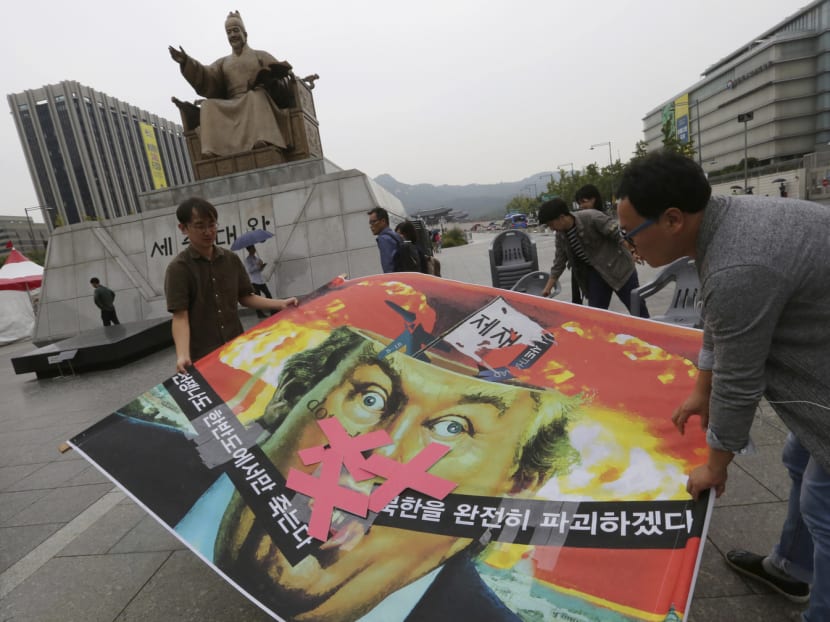Behind Pyongyang’s bluster, some see caution
SEOUL — In the dead of night on Saturday, United States B-1B long-range bombers, escorted by F-15 fighter jets, prowled along North Korea’s east coast, in one of the US military’s most daring manoeuvres on the peninsula in decades.

South Korean protesters carrying a banner depicting US President Donald Trump during a rally near the US Embassy in Seoul yesterday to denounce the United States policy against North Korea. Some long-time observers said it would be wise not to overreact to Pyongyang’s aggressive statements. Photo: AP
SEOUL — In the dead of night on Saturday, United States B-1B long-range bombers, escorted by F-15 fighter jets, prowled along North Korea’s east coast, in one of the US military’s most daring manoeuvres on the peninsula in decades.
Two days later, North Korea’s Foreign Minister Ri Yong-ho declared that Pyongyang had the right to shoot down US bombers even if they were outside its airspace — another escalation in the war of words between the North and President Donald Trump.
But when those planes were near its shores, North Korea did nothing. South Korean intelligence officials told lawmakers on Tuesday that the North’s air-defence radar may have failed to detect their presence. Or, they said, Pyongyang may have simply chosen to avoid a confrontation.
Either possibility would seem to contradict the image North Korea has sought to project: That of a nuclear power eager and able to take on the US. Behind the North’s belligerent rhetoric, some analysts see a leadership anxious to avoid a war it cannot win, and careful to leave itself a rhetorical way out even as it makes threats.
“I hear fear in their voice,” said Mr Shin Won-sik, a three-star general who was the South Korean military’s top operational strategist before he retired in 2015. “They can’t fight a war with the Americans when their fighter jets don’t even fly far because of lack of fuel and fear of crashing.”
Even as the North has matched Mr Trump’s recent bellicose rhetoric, its military has warned units on the border with South Korea against rash decisions and reminded them to report up the chain of command before taking any action, according to South Korean intelligence officials who briefed lawmakers.
“They are careful to avoid an accidental provocation or clash,” Mr Lee Cheol-woo, chairman of the South Korean Parliament’s intelligence committee, quoted officials as saying during the closed-door session.
The extreme rhetoric on both sides and the unconventional nature of both leaders are widely seen as volatile elements in the current standoff between North Korea and the US over Pyongyang’s nuclear weapons programme. Many people fear that North Korea’s leader Kim Jong-un, or Mr Trump might be impulsive enough to start a conflict even if their advisers warn them against it.
But while some long-time observers of North Korea agreed that the situation was fraught with uncertainty, they said it would be wise not to overreact to Pyongyang’s aggressive statements.
“They may have the will but not the means to fight the Americans,” said Mr Shin In-kyun, a military expert who runs the Korea Defence Network, a civic group.
The threat to shoot down a US bomber is a case in point.
Military analysts said it would be all but impossible for Pyongyang to shoot down US warplanes, especially if they were flying in international airspace well off the country’s coasts, as the North Korean SA-5 land-to-air missiles have a range of only 248km.
US warplanes operate under the protection of radar-jamming technology, and North Korea’s ageing MiG fighter jets, which are often grounded for lack of fuel and parts, are no match for them, said Mr Shin and other analysts.
Much as Mr Trump’s aggressive rhetoric about North Korea — like his threat at the United Nations to “totally destroy” the country — appeals to his core supporters, Mr Kim needs to demonstrate to his people that he is not backing down from foreign threats, said analysts.
But they noted that the North tends to couch its threats, however lurid, with carefully worded conditions.
When North Korea threatened last month to create an “enveloping fire” around the US territory of Guam with ballistic missiles, its original statement said only that it was “seriously examining” such a plan.
Responding on Friday to Mr Trump’s UN speech, Mr Kim called him a “mentally deranged US dotard”. But he did not commit to a course of action, saying only that he would “consider” the “highest level of hard-line counter-measure in history”.
And Mr Ri, the foreign minister, did not say on Monday that North Korea would shoot down US bombers, only that it had “the right” to do so.
“The North Koreans know how to choose their words,” said Mr Cheon Seong-whun, a visiting research fellow at the Asan Institute for Policy Studies in Seoul, who served as a presidential secretary for security strategy in South Korea until early this year. “They know how to calculate their stakes. They are not reckless.”
With its threats, North Korea is trying to make the US think twice about further shows of force, even as it seeks to portray itself as playing defence against a US bully, said Professor Lee Sung-yoon, a Korea expert at the Fletcher School of Law and Diplomacy at Tufts University.
At the same time, Pyongyang probably hopes China and South Korea will call for calm and restraint, while using Mr Trump’s threats as justification to conduct another missile or nuclear test, said Prof Lee.
“North Korea has to sound tough because it fears that if it is pushed back under American pressure now, it will never regain its ground,” said Mr Kim Yong-hyun, a professor of North Korean studies at Dongguk University in Seoul. “It fears that if it backs down, China and Russia won’t come to its aid.” THE NEW YORK TIMES






